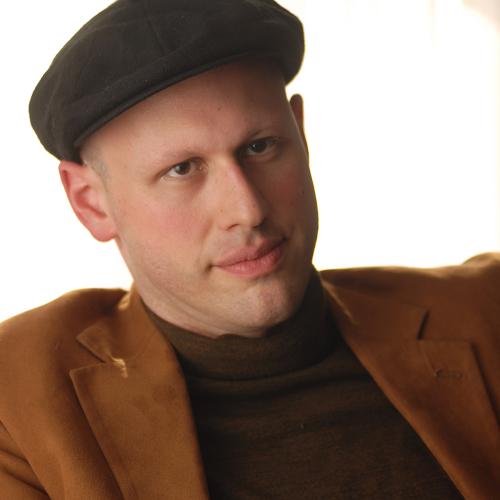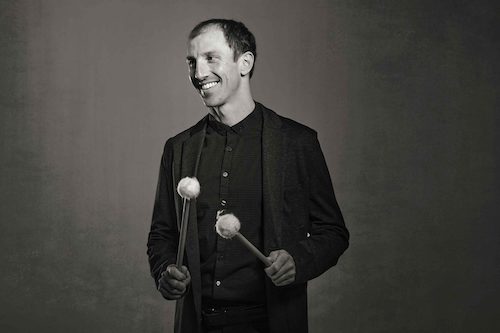by Jarrett Hoffman

Sharlat’s Dumka-22, a commission from ChamberFest Cleveland that will receive its premiere on Saturday, June 25 at 7:30 pm at the Cleveland Institute of Music, was originally conceived around the idea of family — in particular the family at the core of ChamberFest.
That would be Franklin Cohen (clarinet), his daughter Diana Cohen (violin), and her husband Roman Rabinovich (piano) — the three co-artistic directors — as well as Diana’s brother Alexander Cohen (percussion), a frequent performer at the Festival.
So, how about a “family piece” written for that quartet? That was the pitch to Sharlat, the Russian-born composer who was a 2020 Guggenheim Fellow and who teaches composition at the University of Texas at Austin.
“I was very much attracted to this idea,” Sharlat said. He imagined the piece as a mealtime conversation between family members, “all positioned around the piano, which would represent a dinner table.” The music would be relaxed and joyful.
“That’s the piece I was writing when in February, Russia invaded Ukraine.”
Sharlat stopped writing — had to stop. “Every day was consumed by these events, and dealing with the emotions that arose in response. When I came back to the project after a while, the ideas that I had been working on previously seemed very irrelevant and distant to me. So instead I wrote a piece that was more austere and somewhat unsettling — a way for me to process all these complicated emotions and competing identities.”
Born in Moscow, Sharlat studied at the Academy of Moscow Conservatory in his youth, majoring in violin and piano as well as music theory. But there was another instrument that filled a particularly practical role in his life: the clarinet.
“Being a male adolescent in Russia, I knew that at some point I would get drafted into the Russian Army,” Sharlat said. “But I could at least have a fighting chance to survive if I were drafted as a clarinetist to play in the military band, and therefore avoid actually shooting a gun.”
The stakes changed with the start of the First Chechen War. “I knew that if I was drafted, very likely I would be serving in that conflict in some capacity, so there was an urgency to escape,” Sharlat said. At the age of 16, escaping not only the war but also Russian anti-Semitism, Sharlat arrived in the United States, where he would go on to study composition at Juilliard Pre-College, the Curtis Institute of Music, and Yale University.
That history provides a window into the “competing identities” that Sharlat feels: “being from Moscow, but also not being Russian — being Jewish, with roots in Ukraine and Belarus.” And history is only one part of identity. “There’s also my personal past, how people see me, and how I see myself — all of these things are intertwined,” Sharlat said. “Right now I think everybody in the Russian diaspora is going through a similar process.”
He will discuss these issues more during a pre-concert talk on Saturday at 6:30 pm — but he was clear that he sees the music as something separate. “All of that is what went into the piece. What comes out of it is up to the listener.”
Without speaking for other composers, Sharlat strongly believes that he is “incapable” of making a political statement through his music. “To me, it’s a world of sounds,” he said. “If I use a text, then that’s a different story, but if I’m writing absolute music, then I want people to focus just on the sound.”
As for the title, Dumka-22, Sharlat said that it’s not so much a reference to that Ukrainian genre of folk music, but rather to the word itself: literally, dumka is Ukrainian for thought. “It’s the idea of reflection, and that is the aspect I wanted to speak to. I’m not writing a dumka, but it is a dumka in the sense that it is a search for something — a search for identity.”
Musically, one important aspect of the piece is a melody — really a song, Sharlat said — that can’t quite reach its end. “When it gets to the cadence, it doesn’t resolve, and that happens three or four times throughout the piece. The idea of interruption is key.”

At the curve of the piano will be Franklin Cohen, with Diana Cohen close by his side, forming a second musical pairing: clarinet and violin. “A lot of the time, they’re pretty much one instrument together,” Sharlat said. “Then at some point, the clarinet loses the violin and screams into the piano lid, creating this big, echoing sound.”
As you know, Yevgeniy Sharlat does not believe in the word “about” in his music. And it should be noted that I have not heard the piece, of course, and that I’m picking out a single word from this interview to put under the microscope. But thinking of that “scream” in sound, it’s easy to speculate about what that might represent.
Tickets are available here.
Published on ClevelandClassical.com June 21, 2022.
Click here for a printable copy of this article



